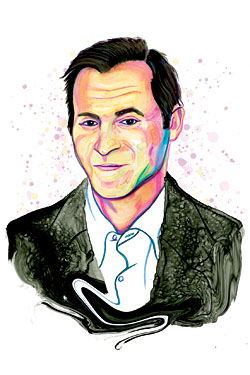
Michael Stuhlbarg gets his breakthrough film role with the Coen brothers’ A Serious Man. And as far as breakthroughs go, it’s a bravely quiet one. Stuhlbarg plays Larry Gopnik, a rational physicist forced to deal with all sorts of irrationality when his wife first asks for a divorce, then moves her lover into their house. The film could just as easily have been called The Straight Man, since Stuhlbarg is essentially reacting to everybody else’s outrageousness—his nagging wife Judith (Sari Lennick), a good-for-nothing brother (Richard Kind), and various rabbis consulted for spiritual guidance. In any other actor’s hands, Gopnik’s passivity would be unendurable, but the actor finds so many subtle ways to register bafflement and good-natured exhaustion that his suffering becomes endlessly entertaining. “The danger was that the performance would become some sort of shticky thing,” says Ethan. “The guy’s kind of a schlemiel, and that could be a Woody Allen character. Michael brought a soulfulness that rescued the character from that.” Stuhlbarg read for three parts; he was so perfect for two of them that at one point the brothers joked about having him play both. “It was a weird casting conundrum we’d never had before,” says Ethan. “We would have cloned him if we could have,” adds Joel.
A rave such as this is nothing new to those who have been following the classically trained actor’s theater work: last year’s Drama League Award–nominee performance as Hamlet for Shakespeare in the Park; his Obie-winning role in David Mamet’s adaptation of Voysey Inheritance; his Tony-nominated turn as a mentally challenged brother in Martin McDonagh’s The Pillowman, a part that could have been a maudlin caricature in less humble hands. “There’s something inside of him that is really recognizable—his feelings, his thought processes are readable to an audience—but you feel at the same time that he’s in touch with something mystical and otherworldly,” says Tony Kushner, who cast him as Louis in a pre-Broadway production of Millennium Approaches (part one of Angels in America) when Stuhlbarg was still a student at Juilliard. “So onstage he can be simultaneously very human and almost mythic. And he’s got one of the strangest and most expressive vocal instruments of any American actor—very soft and rather high-pitched for a man, but still enormously powerful and sexy.”
As Gopnik, a man embroiled in the social complexities of a midwestern Jewish suburb in 1967, Stuhlbarg found himself on familiar terrain. Though he grew up in Long Beach, California, he’s well versed in Jewish culture and clocked many hours at his local Jewish community centers. “It was a huge part of my life as a young person. There wasn’t a lot of research,” says the 40-year-old actor. “Larry’s not a particularly religious Jew. He’s spiritual, but I think that even surprises him. The Coens didn’t delve too much into the larger themes of the movie with me. There were questions raised, but that’s what the movie does. It raises questions and doesn’t answer them.” (The Coens deny that Gopnik is their own father, as some have speculated. “He’s like somebody who could have been in our shul,” says Ethan. “The character isn’t based on a specific person.”)
Stuhlbarg is on to his next project, playing organized-crime kingpin Arnold Rothstein in Martin Scorsese’s HBO drama Boardwalk Empire, due out next year. It’s more of a character role, which is frankly what Stuhlbarg figured his career on any screen would be confined to. “I never thought I’d get a lead role in cinema,” he says. But Kushner considers his potential to be limitless: “Michael’s one of the most remarkable actors I’ve seen. I don’t think there’s anything he can’t do.”